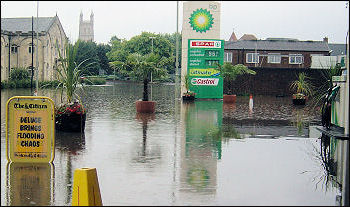Climate change ‘gigantic market failure’

On the climate change demonstration in 2007, photo Paul Mattsson
While the capitalist world leaders argue about figures in Copenhagen, climate change is already affecting billions of lives across the world.
Tom Baldwin
As with the banking meltdown, ordinary people are being made to pay for a crisis caused by the capitalist system and by the bosses’ greed. From those suffering from crop failures in the developing world to the victims of flooding in Britain, it is mainly working class and poor people who are paying for this crisis.
Big businesses will always put their profits before any other consideration, even the future of our planet. All mainstream political parties are funded by big business and support their interests.
Continued below…
Stop Climate Chaos Demonstration
Rally at Speakers Corner, Hyde Park at 12.00 noon
Speakers include John McDonnell MP, Chris Baugh (PCS – Public and Commercial Services Union).
March from Grosvenor Square 1.00pm to Parliament for 3pm.

Flooding in the centre of Gloucester, 2007, photo Chris Moore
The government has stood by and allowed Vestas bosses to close the only wind turbine factory in Britain in order to boost their profits. The Socialist Party, along with Vestas workers who occupied the factory in order to save their jobs, demanded that the plant should be taken into public ownership instead of being closed down.
Capitalist politicians are not willing or able to do what is necessary to stop environmental destruction. The UN has described climate change as a “gigantic market failure” yet the only answers posed are market-based schemes, like carbon trading.
It is not possible to end climate change on the basis of capitalist greed and profiteering. This is only possible through public ownership and democratic control of the world’s resources. The Socialist Party calls for democratic, socialist planning of the economy to allow the majority of people to decide how everyone’s needs can be met while protecting the environment.
Socialist policies for the environment would include a massive investment into renewable and sustainable energy sources. With the profit motive eliminated a plan of production would allow the development of alternatives to fossil fuel and nuclear power.
There could also be investment into an integrated public transport system to reduce people’s reliance on cars. Currently extortionate bus and train fares boost the profits of transport companies that are also subsidised by public money.
Instead, public transport should be taken out of the hands of the fat cats and taken back into public ownership, with profits reinvested in developing public transport and new technology.
A socialist programme of green job creation is also needed. For example, the skills of over 100,000 unemployed construction workers in Britain could be put to use in building new and affordable housing, insulating existing properties and installing solar panels. Instead of closing car factories and sacking workers, socialist planning would allow them to be re-tooled for the production of lower emission vehicles, public transport and other needed goods.
Many of the one million young people who are out of work and not in education could be employed to help develop new technology and alternative energy sources for electricity, heating and transport. This would be a far better public investment than bailing out millionaire bankers.
These measures are all urgently necessary but cannot be done under capitalism. Climate change is yet another example of this system’s failings; a socialist alternative must be built.

Climate change demo December 2005, photo Paul Mattsson







